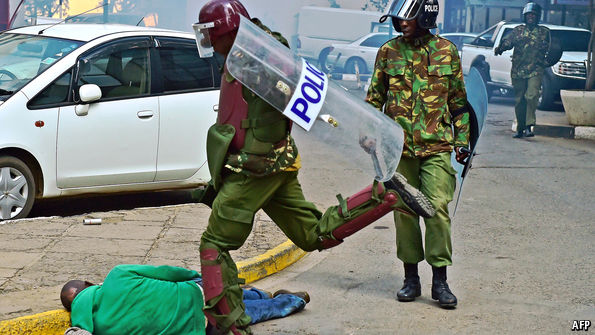
THE picture resembles something from a futuristic dystopia. A police officer in camouflage and purple body armour, a riot shield in his hand, holds his booted foot over the head of a protester, (see article) apparently ready to stomp it into the kerb. The scene was captured on May 16th in downtown Nairobi, the capital of what is meant to be one of Africa’s most stable and hopeful countries. It is an ugly glimpse of a potentially difficult year ahead, as Kenya prepares for presidential elections scheduled for August 2017.
The protests were organised in Nairobi by the main opposition party, CORD, and its leader, Raila Odinga. They were to demonstrate against Kenya’s Independent Electoral and Boundaries Commission (IEBC), which Mr Odinga accuses of being corrupt and biased towards Jubilee, the ruling alliance of Uhuru Kenyatta, the president. Protests were also broken up in Kisumu and Kisii, two cities near Lake Victoria. Police used tear gas and water cannon as well as their batons. At least 15 people were arrested and, according to local television reports, one victim died.
Mr Odinga has a point about the IEBC. It is “a thoroughly corrupt, incompetent organisation with heavily compromised commissioners”, says John Githongo, a journalist and veteran anti-corruption campaigner. In particular, members of the commission are alleged to have received kickbacks from a British firm in exchange for contracts to print ballot papers. In 2013 two of the firm’s executives went to prison in Britain for paying bribes, but none of the recipients has ever been punished.
Yet the protests—and the government’s thuggish response—will unnerve investors in Kenya more than the specific allegations. Kenya’s politics tend to be fought on tribal lines. Mr Kenyatta, who took power in 2013, is from the Kikuyu tribe, which has dominated government for 29 of the 52 years since independence. He won power by building a coalition with the support of his deputy president, William Ruto, who is from the Kalenjin-speaking subgroup. Mr Odinga is from the Luo, a large group who have never held power (though one of their sons is president of the United States).
In 2007 allegations that the election was rigged led to about 1,200 murders. Luos and Kalenjins killed Kikuyus, whom they accused of stealing the vote. Bands of Kikuyus then retaliated, rampaging through rival neighbourhoods. The violence was clearly organised, yet no one has been prosecuted for organising it.
Some fret that mayhem will break out again. Elections in 2013 passed off relatively peacefully, largely because people feared a repeat of 2007, says Mr Githongo. But next year may be different. Although Mr Kenyatta’s and Mr Ruto’s partnership ought to be strong enough for the pair to win a second term, it is not guaranteed. Suspicions that the vote will be rigged in their favour could well spark killings.
The police, meanwhile, are suspected of other misdeeds. Jacob Juma, a businessman who had been a prominent critic of the government, was murdered in his car on May 5th. Mr Odinga has alleged that the police were responsible. The government dismisses his claim as political opportunism. But it will need to convince a lot of Kenyans of its honesty if the next election is to pass without much bloodshed.